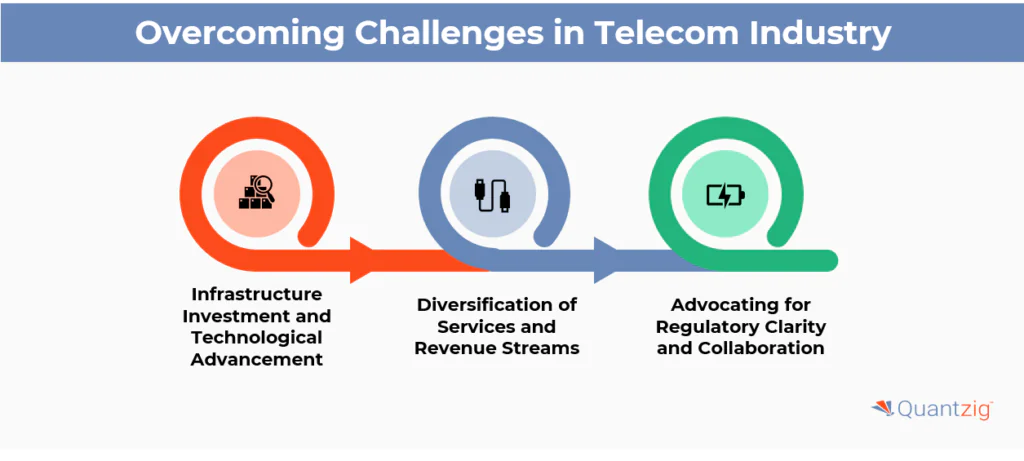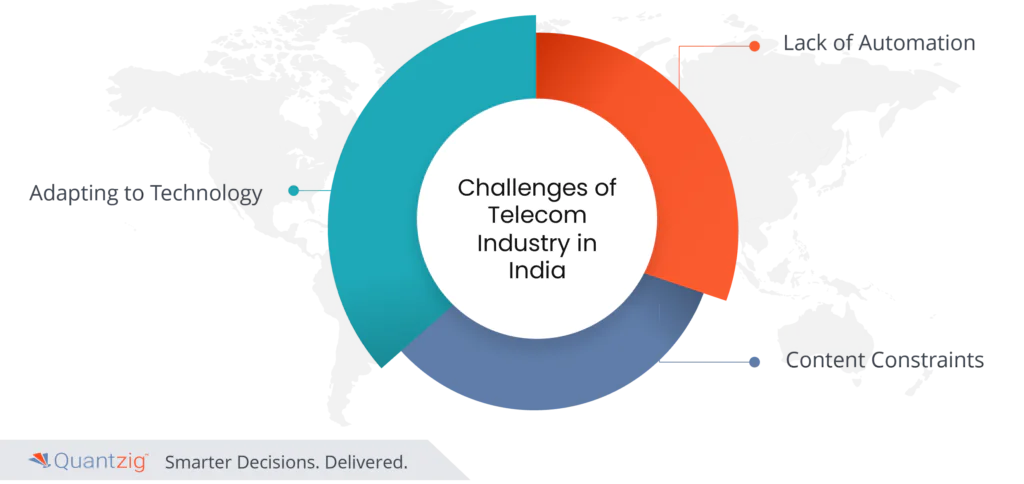Table of Contents
Navigating challenges in telecom industry
Telecom operators face numerous challenges, from rising costs and supply chain issues to integrating advanced technologies like Generative AI and 5G. Balancing these innovations with network quality is crucial. The industry is also shifting towards sustainability and inclusivity, impacting pricing and operations. With market restructuring and increased focus on data protection and cybersecurity, staying ahead is essential.
At Quantzig, we leverage years of experience to guide telecom operators through these complexities, helping them embrace innovation and emerge stronger. Partner with us to tackle these challenges and secure your future success.
Book a demo to experience the meaningful insights we derive from data through our analytical tools and platform capabilities. Schedule a demo today!
Request a DemoTop 10 Biggest Challenges in Telecom Industry: A Deep Dive
The deregulation and liberalization of the telecom industry have led to its spectacular success. But with success comes responsibilities and with responsibilities come challenges. There are many big challenges in telecom industry, especially with the advent of trends like digitization. A few noteworthy ones include:
1. The Privacy-Security-Trust Trifecta:
As cyberattacks escalate and the power of Generative AI (powerful AI that can create realistic content like text, audio, or code) grows, data security is paramount. Telecom companies must prioritize robust cybersecurity measures and develop responsible AI practices to maintain customer trust. Data breaches and ethically questionable AI applications can erode trust quickly, jeopardizing customer loyalty and brand reputation.
2. Customer Empathy During Financial Strain:
The rising cost of living is squeezing household budgets, and consumers feel telecom companies aren’t offering enough support. Implementing solutions like fixed-price guarantees, providing clear explanations of price changes, and improving customer service interactions are crucial to prevent customers from switching to competitors. Companies that demonstrate empathy and offer value-driven solutions will weather this financial storm better.
3. The Talent Tightrope:
Financial pressures are leading to hiring freezes, jeopardizing the future talent pool needed for innovation and growth. Retaining existing talent becomes equally critical. Telecom companies need to develop a comprehensive talent management strategy. This includes investing in upskilling their existing workforce, attracting new talent with competitive compensation and benefits packages, and fostering a positive work culture that thrives in today’s hybrid work environment.
4. Sustainability on Slow Simmer:
Telecom companies are lagging in implementing clear net-zero strategies and improving their climate-related financial disclosures. Investors and environmentally conscious consumers are increasingly demanding action on sustainability. Prioritizing sustainability efforts, setting clear goals for reducing carbon footprints, and actively communicating these efforts are essential for staying competitive.
5. B2B: Beyond Bandwidth:
While some companies are exploring new B2B service areas like the Internet of Things (IoT) and security solutions, these ventures haven’t translated to significant revenue generation. Under-reporting of B2B key performance indicators makes it difficult to measure progress and identify areas for improvement. Furthermore, telecom companies need to shed the image of simply being reliable data providers and build credibility as trusted digital transformation advisors for businesses.
6. Network Quality and Value Equation:
Customers are experiencing unreliable connections and struggling to see the value proposition of faster speeds. Investing in network infrastructure upgrades to ensure consistent and reliable connections is crucial. Additionally, companies need to clearly communicate the benefits of improved network quality and how it translates to a better user experience.
7. Remote Work Revolution:
Telecom employees are increasingly embracing remote work arrangements. To ensure a thriving remote workforce, companies need to prioritize remote skills development through training programs and online resources. Fostering a collaborative and supportive remote work environment with open communication channels is also essential.
8. Ecosystem Engagement Enigma:
Enterprises favor working with telecom companies that have strong ecosystem partnerships, offering a broader range of solutions and expertise. However, concerns about return on investment, a preference for traditional growth strategies, and cybersecurity anxieties remain hurdles to effective collaboration. Telecom companies need to develop compelling value propositions for potential partners and address security concerns head-on to build successful and mutually beneficial ecosystems.
9. Regulatory Rollercoaster:
A complex and evolving regulatory landscape, encompassing everything from merger reviews and tax frameworks to the embryonic regulation of AI, poses significant challenges for telecom companies. Staying abreast of changing regulations, navigating compliance burdens, and adapting business strategies to new legal frameworks is crucial for smooth operations.
10. Infrastructure Asset Optimization:
While efforts to unlock value from infrastructure assets through divestments and partnerships are increasing, there’s room for further optimization. Telecom companies need to develop a comprehensive strategy for maximizing the value of their infrastructure. This may involve exploring innovative monetization strategies, partnerships with emerging technologies, and carefully evaluating divestments to ensure both financial gain and long-term network quality.
By proactively addressing these critical challenges, telecom companies can navigate the current turbulent times, build resilience for the future, and emerge stronger than ever.
Experience the advantages firsthand by testing a customized complimentary pilot designed to address your specific requirements. Pilot studies are non-committal in nature.
Request a PilotHow Quantzig Helps in overcoming the Challenges in the Telecom Industry?
Quantzig addresses the telecom industry challenges through several strategic approaches:

Infrastructure Investment and Technological Advancement
Navigating the complexities of the telecom industry requires a strategic focus on infrastructure investment and embracing cutting-edge technology. At Quantzig, we’ve seen firsthand how telecom operators can overcome challenges like intense competition and the digital divide by prioritizing network expansion and upgrades. Investing in advanced technologies, such as 4G and 5G, isn’t just about improving data speeds; it’s about enhancing reliability and service quality to meet the growing demands of both consumers and businesses. A robust, scalable infrastructure is key, and the development of fiber-optic networks and wireless backhaul systems is essential, particularly for delivering seamless connectivity in rural and underserved areas.
Diversification of Services and Revenue Streams
The telecom landscape is evolving, and so should your service offerings. It’s no longer enough to rely on traditional voice and data services. Telecom operators must diversify into broadband, content streaming, IoT solutions, and enterprise services. At Quantzig, our years of experience have shown that broadening your service portfolio opens new revenue streams and reduces dependency on price-driven competition. Collaborating with content providers and creating compelling value-added services not only attracts or retain customers but also fosters long-term loyalty.
Advocating for Regulatory Clarity and Collaboration
Engagement with regulatory authorities is more than a necessity; it’s an opportunity. At Quantzig, we advocate for telecom operators to actively participate in shaping the regulatory landscape. Clear regulations are vital for long-term planning and investment, and partnerships with government initiatives, like BharatNet, offer significant opportunities. These public-private collaborations are crucial in bridging the digital divide, especially in rural areas.
Building Trust and Enhancing Workforce Capabilities
The current economic climate has highlighted some of the vulnerabilities within the telecom industry, particularly concerning consumer trust. With rising costs and unreliable broadband services causing frustration, telecom providers need to regain trust through transparent pricing and fixed-price guarantees. At Quantzig, we understand that to stay competitive, telecom companies must also focus on talent and skills management. Prioritizing workforce development ensures your organization is equipped to innovate, compete, and address emerging challenges, including the growing importance of decarbonization strategies. By tackling these issues head-on and attracting top talent, you can secure your position in a rapidly changing market.
Quantzig’s expertise in the telecom sector, built on years of experience working with leading clients, positions us as your trusted partner in navigating these challenges. Let’s work together to transform these challenges into opportunities for growth.
What the Future Holds for Telecom Industry?

The past few years have been a whirlwind for the telecommunications industry. A confluence of factors – the rising cost of living, ongoing supply chain disruptions, the COVID-19 pandemic, and more – have fundamentally reshaped customer needs and expectations. This shift in consumer and enterprise demand landscapes creates a double-edged sword: new opportunities exist, but the risk of customer confusion and frustration is also heightened.
To navigate these turbulent waters of network congestion in telecom, telecom workforce shortages, cost challenges in telecom, cybersecurity issues in telecom, and ensure long-term success, telecom companies must revisit their customer promises. Re-articulating core values in a clear and concise manner, alongside simplifying value propositions, will be crucial for maintaining relevance and delivering long-term value to customers.
Get started with your complimentary trial today and delve into our platform without any obligations. Explore our wide range of customized, consumption driven analytical solutions services built across the analytical maturity levels.
Start Your Trial nowConclusion
In conclusion, the telecom industry faces formidable challenges, including intense competition, high spectrum costs, and regulatory complexities. The industry’s success hinges on its ability to navigate these hurdles strategically. By investing in advanced infrastructure and diversifying services, telecom companies can enhance their competitiveness. Additionally, active engagement with regulatory authorities and collaborations with the government are vital for creating a conducive environment for growth and expanding connectivity, particularly in underserved regions. Overcoming these telecom industry challenges is imperative to not only endure but thrive in an increasingly digital and interconnected world.




